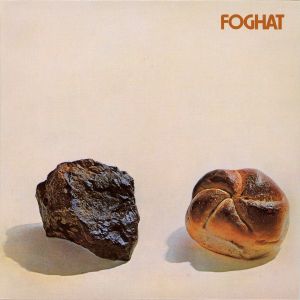
- Format: MP3

Size: 73.8 MB
Bitrate: 256
mp3
Ripped by: ChrisGoesRock
Artwork Included
Japan 24-Bit Remaster
Foghat's second album finds the group working its way towards the fusion of blues and hard rock that would make them an arena rock favorite. They were not yet the stadium kings they would soon become, but Rock and Roll benefits from a muscular production that gives the band a muscular sound worthy of their impressive live act. A good example is the powerful album opener "Ride, Ride, Ride": Lonesome Dave Peverett wails over a boogie beat fortified by rumbling power chords as gospel-style backup vocalists cheer him on at the chorus. "Road Fever" is another choice rocker, a song about the rock & roll touring life (a recurrent Foghat song subject) that spices up its fuzz guitar rock with a rubbery bassline and a attractive but non-intrusive horn section. However, not everything on Rock and Roll is as inspired as these two tracks: songs like "Feel So Bad" and "She's Gone" succumb to cliché boogie-rock lyrics that are as dull as their titles and plodding song structures that lack hooks and inventive arrangements. Despite this occasional lack of inspiration, the band manages to pull off a few surprises here and there that show they were looking forward: "Helping Hand" crossbreeds the band's boogie sound with acoustic country-rock touches to create a tune that sounds like the Eagles on steroids, and the power ballad "It's Too Late" succeeds despite its cliché lost-love lyrics, thanks to a sharp arrangement that shows off the sharp guitar interplay between Peverett and Rod Price. All in all, Rock and Roll lacks the consistent material to win over casual rock fans, but any Foghat enthusiast will find plenty to enjoy on this disc.
Foghat specialized in a simple, hard-rocking blues-rock, releasing a series of best-selling albums in the mid-'70s. While the group never deviated from their basic boogie, they retained a large audience until 1978, selling out concerts across America and earning several gold or platinum albums. Once punk and disco came along, the band's audience dipped dramatically.
With its straight-ahead, three-chord romps, the band's sound was American in origin, yet the members were all natives of England. Guitarist/vocalist "Lonesome" Dave Peverett, bassist Tony Stevens, and drummer Roger Earl were members of the British blues band Savoy Brown, who all left the group in the early '70s. Upon their departure, they formed Foghat with guitarist Rod Price. Foghat moved to the United States, signing a record contract with Bearsville Records, a new label run by Albert Grossman. Their first album, Foghat, was released in the summer of 1972 and it became an album rock hit; a cover of Willie Dixon's "I Just Want to Make Love to You" even made it to the lower regions of the singles charts. For their next album, the group didn't change their formula at all — in fact, they didn't even change the title of the album. Like the first record, the second was called Foghat; it was distinguished by a picture of a rock and a roll on the front cover. Foghat's second album was their first gold record, and it established them as a popular arena rock act. Their next six albums — Energized (1974), Rock and Roll Outlaws (1974), Fool for the City (1975), Night Shift (1976), Foghat Live (1977), Stone Blue (1978) — all were best-sellers and all went at least gold. "Slow Ride," taken from Fool for the City, was their biggest single, peaking at number 20. Foghat Live was their biggest album, selling over two million copies. After 1975, the band went through a series of bass players; Price left the band in 1981 and was replaced by Erik Cartwright.
In the early '80s, Foghat's commercial fortunes declined rapidly, with their last album, 1983's Zig-Zag Walk, barely making the album charts. The group broke up shortly afterward with Peverett retiring from the road. The remaining members of the band (Roger Earl, Erik Cartwright and Craig MacGregor) continued playing together as the Kneetremblers and after some line-up changes decided to revert to the Foghat name. The band toured throughout the decade and into the early 1990's. Perhaps growing tired of early retirement, Lonesome Dave formed his own version of Foghat in 1990 and hit the road. After healing their rift, the original Foghat (Peverett,Price, Stevens and Earl) reformed in 1993 and toured for years, releasing Return of the Boogie Men in 1994 and Road Cases in 1998. The original band broke apart for good with Peverett's passing due to cancer on February 7, 2000. After some time spent mourning, the band soldiered on with a new line-up (adding Charlie Huhn on vocals) and after two years of touring released Family Joules in 2002. Foghat toured for the next few years and regularly issued documents of their live act: The Official Bootleg DVD, Volume 1 in 2004 and Foghat Live II in 2007.
01.Ride, Ride, Ride
02.Feel So Bad
03.Long Way To Go
04.It's Too Late
05.What A Shame
06.Helping Hand
07.Road Fever
08.She's Gone
09.Couldn't Make Her Stay